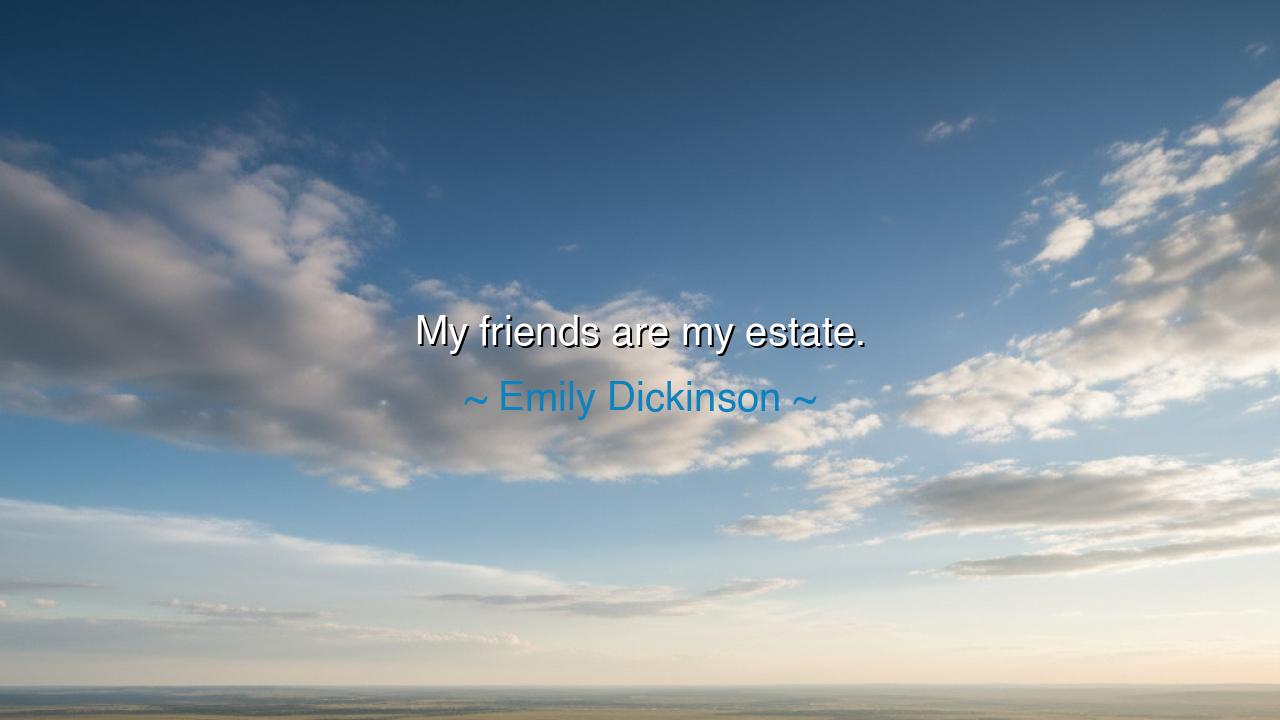
My friends are my estate.






“My friends are my estate.”
Thus wrote Emily Dickinson, the recluse of Amherst, whose quiet genius revealed truths that thundered softly across time. In this brief and shining declaration, Dickinson captures a truth that transcends wealth and worldly possession—that the truest riches a person can hold are not found in gold or land, but in the hearts of those they love. When she calls her friends her estate, she speaks as one who has measured the treasures of the soul and found that nothing in this world endures like the warmth of friendship. Her words are simple, yet they gleam with the wisdom of one who understood that affection is the only true inheritance worth cherishing.
The origin of this saying can be found in Dickinson’s life, which was outwardly small but inwardly vast. She lived much of her existence in solitude, choosing the quiet of her home over the noise of society. Yet her isolation was not emptiness—it was contemplation. Through letters and poems, she nurtured deep connections with a small circle of kindred spirits: her sister Lavinia, her lifelong friend Susan Gilbert Dickinson, and a handful of correspondents who became her intellectual companions. Though she owned little in the way of property or riches, she saw herself as wealthy in love. To Dickinson, friendship was not an ornament to life; it was its very essence, the gold of the heart that no storm could tarnish.
The meaning of her words lies in the contrast between material and spiritual wealth. To say “my friends are my estate” is to declare that the value of life is not measured in what one possesses, but in what one shares. The estate of the soul is not built on acres of earth, but on the trust, compassion, and understanding that bloom between hearts. Material fortunes fade, but friendship endures beyond death itself. It is the bond that time cannot erode, the memory that outlives all monuments. Dickinson’s insight reminds us that true prosperity belongs to those who have loved and been loved—for friendship enriches the spirit in ways no currency can equal.
History offers many living examples of this truth. Consider the friendship between Ralph Waldo Emerson and Henry David Thoreau, two men whose ideas shaped the very thought of America. Emerson, already renowned, opened his home and heart to the younger Thoreau, who in turn became both student and companion. When Thoreau went to live at Walden Pond, Emerson provided not money but faith—faith in his friend’s vision, faith in his worth. And when Thoreau died young, Emerson mourned him not as a philosopher lost, but as a treasure of the soul, saying that Thoreau had lived with “a pure integrity and a boundless friendship.” Their bond was their inheritance—a wealth of mind and heart that enriched not only each other but generations to come.
In her quiet way, Dickinson’s message is heroic. She rejects the false gods of fortune and fame and places her crown upon the altar of human connection. The world chases possessions, yet she reminds us that possessions can own their possessors. Friends, by contrast, are living blessings—gifts freely given, not acquired. They are mirrors that reflect our light when the world grows dark, voices that call us back to ourselves when we have forgotten who we are. To be rich in friendship, then, is to live abundantly, no matter how poor in material things. Such wealth cannot be stolen, taxed, or lost—it is carried within.
Her words also challenge us to examine how we cultivate this estate. Just as land must be tended to yield fruit, so must friendship be cared for through patience, honesty, and presence. It is not enough to possess friends in name; we must invest in them with our time and our heart. The soil of friendship flourishes through acts of kindness, forgiveness, and truth. And in return, it yields the harvest of companionship—the comfort of knowing that even in solitude, one is never truly alone. Dickinson, who lived apart from the world, still found her soul encircled by invisible arms of affection.
Let this be the lesson: count your wealth not by what fills your hands, but by who fills your heart. Do not envy those whose estates are large, but rather those whose friendships are deep. Write to your friends, speak kindly of them, forgive them their faults, and cherish their loyalty as you would a rare jewel. For when the final reckoning of life arrives, it will not be the ledger of property that matters, but the ledger of love—the friendships that lifted you, sustained you, and bore witness to your journey.
Thus, the wisdom of Emily Dickinson stands eternal: “My friends are my estate.” To live by these words is to walk through the world as one already rich—rich in spirit, rich in gratitude, rich in love. For when we give ourselves to friendship, we inherit the only treasure that time cannot diminish, and death cannot destroy. And in that treasure lies the true measure of a life well lived.






AAdministratorAdministrator
Welcome, honored guests. Please leave a comment, we will respond soon